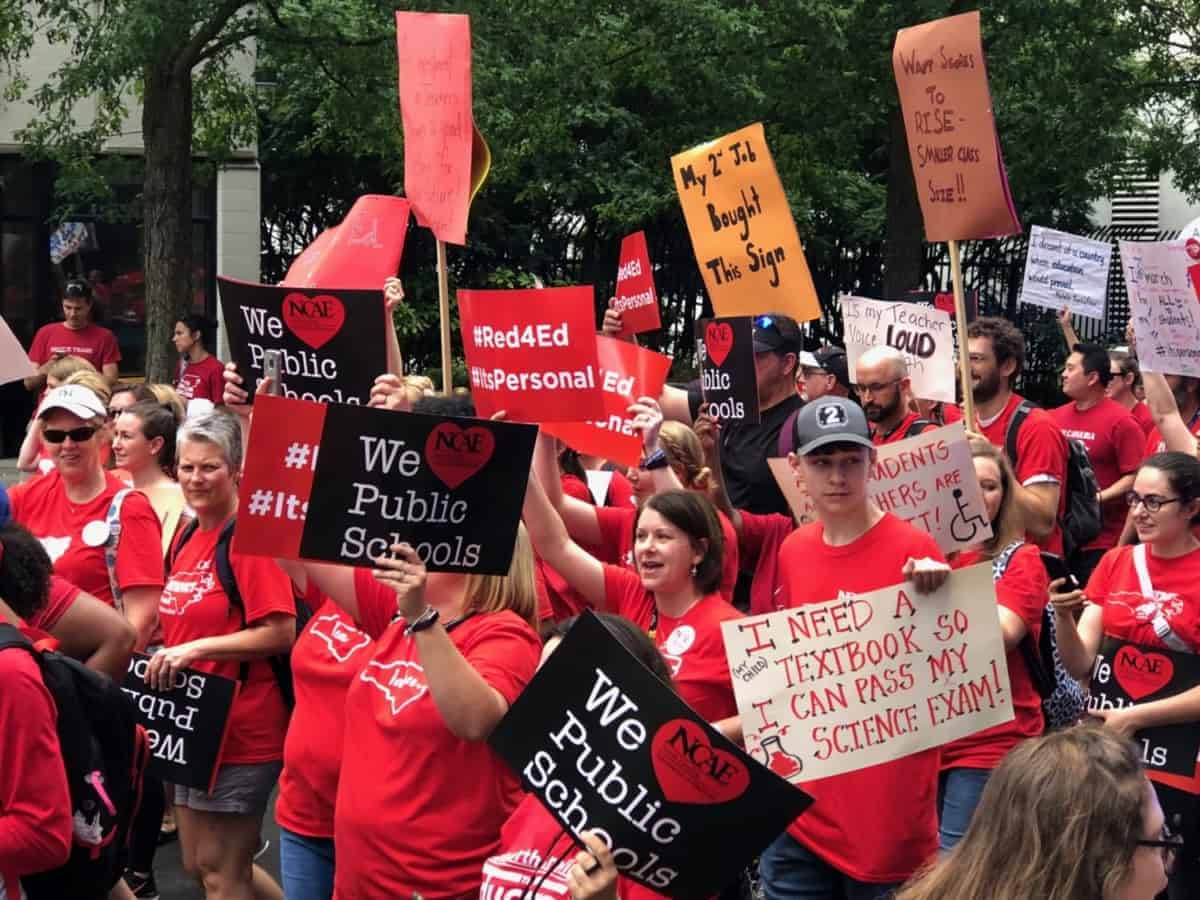Last May 16 saw unprecedented action by thousands of North Carolina educators. Energized by the boldness of our colleagues in states like West Virginia and Arizona, we marched through the streets of Raleigh to the state legislature to let lawmakers know that we’d had enough of their indefensible lack of support for public education. We flooded the legislative building with a sea of red, filling the galleys of both Senate and House chambers and chanting: “Remember, remember, we vote in November!” so loudly that the Speaker of the House had to momentarily halt business because nobody on the floor could hear what he was saying.
In November we held true to our word and worked tirelessly to keep education at the forefront of the general election. Through our advocacy, dozens of pro-public education candidates were elected all over the state. We broke the eight-year Republican supermajority that was responsible for much of the appalling education policy we marched against, and we restored Gov. Cooper’s veto. We demonstrated our collective power and won big for our schools and for our children.
But we’re not done yet.
Earlier this year, we surveyed thousands of educators and public school supporters to find out what they saw as the biggest obstacles facing public education in North Carolina. At the convention of the North Carolina Association of Educators last month, delegates were polled to determine, of the challenges identified, which were the five most pressing. Our delegates then voted overwhelmingly to hold a Day of Action on Wednesday, May 1. That day, we’ll be descending on Raleigh again to send a clear message to lawmakers about what our public schools need from them.
These are our five demands:
1. Provide enough school librarians, psychologists, social workers, counselors, nurses, and other health professionals to meet national standards.
Youth suicide in North Carolina has doubled over the last decade, and many of our students do not have access to mental health care. Our schools are in a position to help, yet staffing ratios for student support services in the state remain far below recommended levels. For example, the suggested ratio of psychologists per student is 1:500-700. Statewide, our ratio is 1:2083.
2. Provide a $15 minimum wage for all school personnel, a 5% raise for all ESPs (non-certified staff), teachers, and administrators, and a 5% cost of living adjustment for retirees.
The past few years have seen some progress on educator salaries, but North Carolina remains far behind the national average and ranks 49th in wage competitiveness. Our veteran teachers and non-certified employees, such as custodians and teacher assistants, have been largely left out in the cold on recent raises, as have retirees. It’s way past time for a significant commitment to all school employees.
3. Expand Medicaid to improve the health of our students and families.
Good health forms the foundation of success in the classroom, yet lots of children do not have access to quality health care. Research shows that expanding Medicaid for their parents results in a “welcome mat effect” with increased enrollment of children. Closing the health coverage gap in North Carolina would remove an important barrier to learning for many of our most needy students.
4. Reinstate state retiree health benefits eliminated by the General Assembly in 2017.
State lawmakers eliminated retiree health benefits in the 2017 budget. All state employees hired after January 1, 2021 will be forced to purchase their own health insurance when they retire. This change cripples recruitment and retention of educators at a time when our teacher pipeline is already in crisis, and it must be reversed.
5. Restore advanced degree compensation stripped by the General Assembly in 2013.
The revocation of master’s pay has led, unsurprisingly, to a sizeable decline in those seeking graduate degrees in education at UNC schools. Recent research out of N.C. State and UNC-Chapel Hill finds a positive impact on student attendance, achievement, and evaluation results for teachers who hold a master’s degree in their subject area.
North Carolina’s state legislators are in long session this year and will soon be crafting the 2019-21 budget. Supporters of public education are in an excellent position to help shape the priorities reflected in that budget, provided we can bring sufficient pressure. To do that, we need to turn out in massive numbers on May 1.
If you’re ready to help us fight for the changes our schools desperately need, please take this survey to help All Out May 1 organizers measure statewide interest and level of commitment.
What we saw last May is that we are powerful when we rise together. This year, we’re more focused. This year, we’re more organized. And this year, we can be even more powerful.
Teachers, put in that personal day, and we’ll see you in Raleigh.



